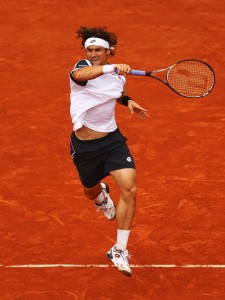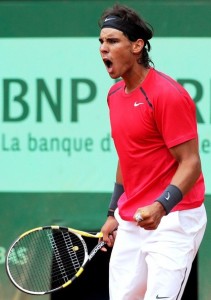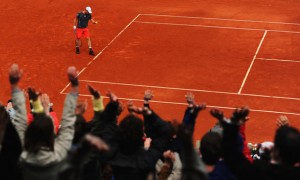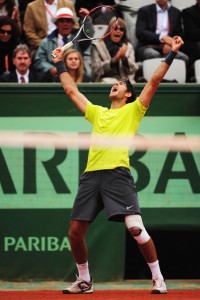French Open, Day Nine
The definition of when the second week of a major truly begins is contested, fraught and ultimately not very interesting, which is why I’m going to spend some time on it.  Much like Douglas Adams’ recipriversexcluson – ‘a number whose existence can only be defined as being anything other than itself’ – the second-week of a major can seemingly commence at any moment other than the tournament’s second Monday, for all that this nominally kicks off the actual second week, although not at Roland Garros. Like I said, it’s complicated.
Much like Douglas Adams’ recipriversexcluson – ‘a number whose existence can only be defined as being anything other than itself’ – the second-week of a major can seemingly commence at any moment other than the tournament’s second Monday, for all that this nominally kicks off the actual second week, although not at Roland Garros. Like I said, it’s complicated.
In the case of the French Open, today actually marked the beginning of the third calendar week. With this in mind, Roland Garros’ ongoing commitment to Sunday starts therefore bears reading as a subtle affirmative action policy towards lower ranked players. Apart from those few poor buggers who lose on the opening day, just about everyone therefore gets to experience the second week of a major, which is, I think, a special treat. The famous quote that you can’t win a major in the first week but you can lose one – commonly ascribed to the Greek philosopher Pete Sampras – grows more complicated by the realisation that you can’t win the French Open until the third week. I suppose this is a minor matter, given the fact that unless you’re Rafael Nadal, you can’t win it at all.
The US Open’s decision to conduct itself in hurricane season on a land-filled swamp creates further issues, which are compounded by the bloody-minded determination to spread the opening round over three days. Monday finals have become the norm, casting yet more doubt on Sampras’ credentials as a theorist. It turns out fully half the majors can’t be won in the second week, either.
A persistent deluge through the middle part of last year’s US Open saw the schedule back up disastrously, guaranteeing widespread discontent, and inspiring everyone to turn on Caroline Wozniacki when she sought but failed to lighten the mood. Andy Roddick, who’d gone to some effort to anoint himself the man of the people, expressed his profound joy at returning to the second week of a major upon winning his second round match. He’d already brow-beaten the attendant media so thoroughly through the first week that no one retained the wherewithal to point out the absurdity of this. The Australian Open, meanwhile, splits the fourth round across the middle Sunday and Monday, thereby rendering a calendar definition useless. Wimbledon takes the middle Sunday off, and plays all round of 16 matches on the second Monday. This generates a spectacular day’s entertainment, though it doesn’t feel quite like the second week.
As I say: fraught and contested. My own definition of the second week has it commencing with the quarterfinals, and is based on the rationale that a reasonable cross-section of players would be pleased to have gotten this far.  Lower-ranked players are invariably thrilled to reach this point, while the top-ranked guys aren’t suicidal if they lose. Beyond that, the quarterfinals seem to mark the point at which the tenor of the tournament shifts. The upshot of this is that Roland Garros, after nine full days of play, is about to commence its second week. With the exception of Tomas Berdych, everyone you’d expect to have survived so far has.
Lower-ranked players are invariably thrilled to reach this point, while the top-ranked guys aren’t suicidal if they lose. Beyond that, the quarterfinals seem to mark the point at which the tenor of the tournament shifts. The upshot of this is that Roland Garros, after nine full days of play, is about to commence its second week. With the exception of Tomas Berdych, everyone you’d expect to have survived so far has.
(2) Nadal d. (13) Monaco, 6/2 6/0 6/0
Some have done rather better than survive. Nadal has dropped only 19 games on his gambol to the final eight, his fewest in eight visits. He has never looked worse than unbeatable, and at times has looked considerably finer than that, particularly in the match against Denis Istomin. Undeniably, his draw has been easy, but no easier than Novak Djokovic’s, and certainly tougher than Roger Federer’s. I realise that this is a contested area as well; a frankly pointless debate as to whose inevitable progression to the second week has been the least inevitable, as though it really matters.
Each of them can only face the men placed before them, and Nadal has been merciless in making every opponent wish he’d been placed somewhere else. I’ve actually been looking for an opportunity to write about him, but frankly there isn’t much to say about constant straight-sets drubbings, although I’m sure his fans would insist I’m glossing infinite nuance. I will say that I think the defending champion was more impressive against Istomin than against Juan Monaco, who played quite poorly, even for a guy who wasn’t permitted to play well. Milos Raonic probably wouldn’t have won a set, either, but I have no doubt he would have won more than two games, and provided Nadal with a sterner, and arguably more useful challenge.
(12) Almagro d. (8) Tipsarevic, 6/4 6/4 6/4
In the quarterfinals Nadal will, deep down in the sub-cockle area, be pleased to face Nicolas Almagro, who today took out Janko Tipsarevic in straight sets. As ever, Almagro looked like the world’s best clay courter. That’s precisely what he is until the better ones show up, which they have a habit of doing at any event grander than a 250. Unfortunately for him these players are all still in the tournament, apart from Robin Soderling, who is apparently still in Sweden.  Still, reaching the second week of a major is a considerable achievement for Almagro, who generally prefers to lose early, so as to leave that week clear for planning his next campaign in Båstad, Nice or Buenos Aires.
Still, reaching the second week of a major is a considerable achievement for Almagro, who generally prefers to lose early, so as to leave that week clear for planning his next campaign in BÃ¥stad, Nice or Buenos Aires.
(4) Murray d. (17) Gasquet, 1/ 6 6/4 6/1 6/2
Andy Murray’s innate contrariness proved useful today, allowing him to harness the crowd’s vicious and sustained disapproval, and push it deep down into the pit of his gut, where it was transformed into a force of untrammelled destruction. It took about a set and a half for this subtle gastric alchemy to occur. After that the hapless Richard Gasquet was scourged from the face of the court. It’s worth finding some highlights. Andy Murray was finally playing the way everyone says he should. This might be a cause for celebration, but we should bear in mind that Gasquet played the way he should against Tommy Haas the round before. No one plays the way they should all the time. It’s a simple point, and it’s amazing how easily it is forgotten. Murray will kick off his second week with David Ferrer. If Murray plays like he eventually did today, even Ferrer, festooned with canine metaphors, will fall quickly. We may therefore expect a dogged epic. Ferrer, for the record, beat Marcel Granollers. For a brief moment, around the grounds, blessed silence reigned.
(9) Del Potro d. (7) Berdych, 7/6 1/6 6/3 7/5
The top-half quarterfinalists were also decided. Federer will face Juan Martin del Potro, who he hasn’t lost to since the latter’s wrist returned from its gap-year (in which it bummed around South-East Asia and discovered Jim Morrison and Karl Marx). You might recall that the first three months of del Potro’s season were largely constrained by hidings at Federer’s hands, across four continents, although these were mostly in fast conditions. You might also recall that Federer had a hell of a time getting past the Argentine on his way to the 2009 Roland Garros title.  Amidst all this recollection and reverie, del Potro’s win over Berdych should not be forgotten. It wasn’t a decisive win, but it was a win, and Berdych is by a considerable margin the finest player anyone has beaten so far in this tournament. The weather will also play a role. The forecast is for frigid, dull and dense conditions, not unlike Federer’s quarterfinal loss to Soderling in 2010, in which the bigger man’s capacity to penetrate the court proved definitive. Even ignoring his patchy form, Federer’s fans are justified in their concern.
Amidst all this recollection and reverie, del Potro’s win over Berdych should not be forgotten. It wasn’t a decisive win, but it was a win, and Berdych is by a considerable margin the finest player anyone has beaten so far in this tournament. The weather will also play a role. The forecast is for frigid, dull and dense conditions, not unlike Federer’s quarterfinal loss to Soderling in 2010, in which the bigger man’s capacity to penetrate the court proved definitive. Even ignoring his patchy form, Federer’s fans are justified in their concern.
(5) Tsonga d. (18) Wawrinka, 6/4 7/6 3/6 3/6 6/4
Finally, Novak Djokovic will face Jo-Wilfried Tsonga. Anyone who tells you how that one will turn out is guessing. This time last year Djokovic was chasing history, and we were uneasily wondering how he might possibly lose a match ever again. History beckons once more, like an alluring Jezebel, but this year his march towards her feels far less assured. Faced with the looming and admittedly hunky Andreas Seppi, the world No.1 tripped on his trousers whilst removing his socks, and reeled heavily in to the dressing table. Whether the subsequent blow to head returned him to his senses remains to be seen.
In Tsonga he’ll face a player who can handle almost anyone, whether he’s in the mood or not. When he is in the mood, there are few more arousing sights in the sport, even as he’s man-handling your favourite player, and rendering their best efforts irrelevant. Those for whom Tsonga is their favourite player – I’ll admit he ranks among mine – will be hoping for some of this tomorrow. The question will be which version of Djokovic shows up – they’re differentiated by serial number – and whether Tsonga will maintain his commitment if and when he the world No.1 lifts. Let’s not forget his early contention that no Frenchman could win the tournament, and that this is his first trip to the quarterfinals here. He is into the second week of Roland Garros. Will that be enough?
